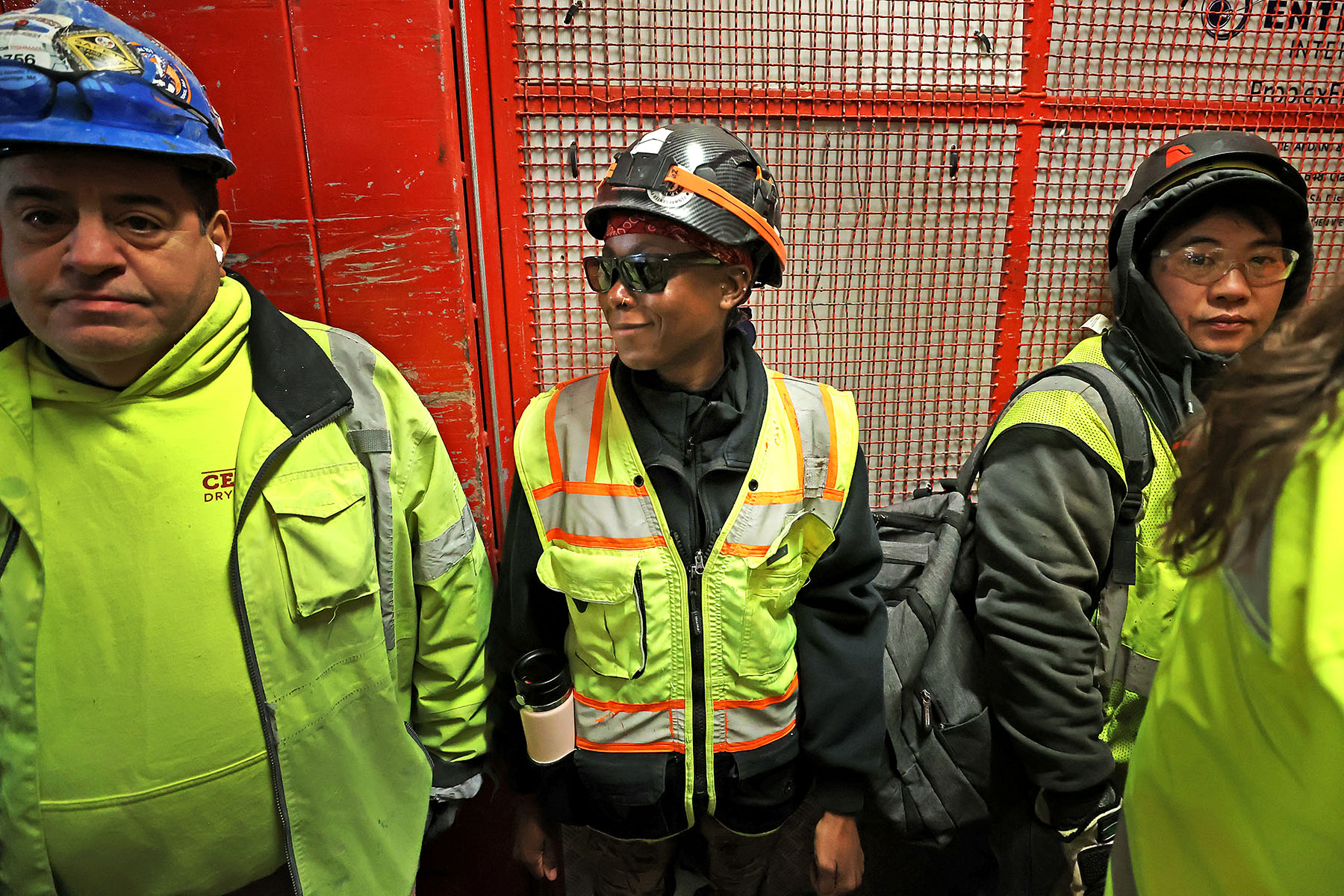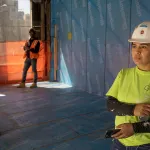For decades, women have worked diligently to carve out a space in the construction workforce, where discrimination and sexual harassment have kept the predominantly male industry, well, male.
Across the country, they organized for recognition. First in small committees that cropped up in places like Fort Worth, Texas, where in 1953, women came together to create their own support network later called the National Association of Women in Construction. Over the years they worked with their unions and created nonprofits in places like Oregon, Wisconsin, Vermont, Florida and Chicago to advocate for issues affecting women like how to change the hostile workplace culture, and deal with the persistent lack of child care for the early hours they often work.
The government created its own policies to ensure federal contractors were doing their due diligence to recruit and hire from a diverse workforce. But the Biden administration in particular was a boon to the movement, said Jayne Vellinga, executive director of Chicago Women in Trades (CWIT), a nonprofit aimed at bringing more women into construction jobs.
Under Biden, the Commerce Department announced its goal to bring a million women into construction jobs, and created a requirement that recipients of large federal grants for semiconductor manufacturing include a plan for child care. The administration had also passed two laws aimed at boosting infrastructure in the country, which created a demand for skilled workers.
It was the perfect storm of opportunity and funding to expand their programming to bring more women into the workforce. “Our placement numbers have never been higher,” Vellinga said. But when Donald Trump returned to the White House, the forward momentum collapsed almost overnight. In a fiery inauguration speech, he declared he would dismantle diversity, equity and inclusion (DEI) initiatives in the government and create what he calls a color-blind, merit-based society. He promptly issued two executive orders calling DEI policies immoral and illegal and vowed to claw back funding.
Just two days later, CWIT received word that all of its federal grants were under review. These grants constitute 40 percent of CWIT’s budget, and the loss would jeopardize the future of the nonprofit’s work.
“We have complete whiplash,” Vellinga said.

Additionally, the tariffs have disrupted the construction industry, leading to a potential slowdown in projects and consequentially less need for workers, she said.
The nonprofit, whose participants overwhelmingly identify as Black and Latina women, offers pre-apprenticeship training covering topics like workplace safety and basic technical skills. It also partners with unions and industry leaders to advocate for workplaces free of discrimination and harassment, and trains employers in how to make construction sites more inclusive of women.
It’s work that is desperately needed in an industry where one in four women say they are always or frequently harassed, and where one in five LGBTQ+ workers say the same, according to findings from the Institute for Women’s Policy and Research. The Equal Employment Opportunity Commission issued a report in 2023, which found that discrimination was still rampant in the industry, citing several instances of employers not hiring people because of their gender or race.
But that report has been erased from the website, and Vellinga said she feels like the reality of who is being discriminated against is being erased, too. “This narrative that women are taking jobs away from more qualified people has never been true. They are qualified and just asking companies to overcome whatever biases to give them a fair shot.”
The efforts taken to dismantle their work might also not be legal. In February, the nonprofit filed a lawsuit against the administration and several agencies, including the Department of Labor, seeking to declare the DEI executive orders unconstitutional. They are also suing on the grounds that the clawback of federal funds is outside of the jurisdiction of the Executive Branch since they are approved by Congress, and that it’s also infringing on their First Amendment right to free speech.
“What the Trump administration is trying to do is say that for you to receive this federal funding you have to adopt the administration’s viewpoint that DEI is impermissible, and you have to agree with our political agenda,” said Gaylynn Burroughs, a lawyer from the National Women’s Law Center, one of the organizations that is representing the CWIT in court. “The government is not allowed to do that.”
Catherine Fisk, a law professor at the University of California, Berkeley, said in effect the orders chill constitutionally protected speech and threaten legal action against organizations who cannot know what it is that they are prohibited from doing because it’s so vague. “That is both a First Amendment violation that is broadly prohibiting advocacy and a due process violation,” she said: “The government is threatening to punish people without being clear of what they are being punished for.”
The 19th reached out to the Department of Labor, The Office of Management and Budget and the Department of Justice, which were all named as defendants, but did not hear back by press time.
Promoting diversity, equity and inclusion is not illegal, and these executive orders are a way to attack ideals fundamental to American society, Burroughs said. “When you peel it back, what we’re really talking about is the ability for people to not be discriminated against,” she said. “We do a disservice when we’re saying that it’s an attack on DEI. It’s an attack on civil rights, on workplace anti-discrimination.”
She continued: “The message that is being conveyed is, if you are not a white heterosexual man, and you are in public life, or you are in a job where you are successful, that you must have gotten there because of some unfair advantage, and that is really a poisonous way of thinking.”
In addition to endangering federal funding for DEI work, the Trump administration also rescinded an executive order that had been in place since 1965. The order prohibited federal contractors from discriminating in its hiring practices and required them to take affirmative actions to ensure that it was trying to recruit and hire women and people of color for its jobs, which are paid for with taxpayer dollars and in theory should be accessible to anyone who is qualified. Because some groups have been so effectively shut out of certain jobs, that work can look like providing opportunities for specific groups like women to learn skills and receive training to be competitive applicants in the job pool.
To help enforce the 1965 order, the Office of Federal Contract Compliance Programs could perform audits on job sites to also ensure the workplaces were protecting employers equal rights. Jenny Yang, the former director of the office under Biden, said in some cases an audit has uncovered that women don’t have proper fitting personal protective equipment which can pose a safety risk, or are being harassed or discriminated against in other ways.
“Having an OFCCP investigator auditing those practices is what often catalyzes change because workers see that the federal government is there,” she said. It also offers workers an opportunity to report issues with their workplace anonymously versus having to file a complaint against their employer, which can open them up to retribution.
The agency has also played a role in correcting pay discrimination by conducting pay audits, said Yang. From 2014 to 2024 the agency obtained $261 million for employees and job seekers who were discriminated against. That money went to over 250,000 employees and applicants. That number included about 25,000 White people and men, who were alleged to have been discriminated against. “Our anti discrimination laws protect everyone,” Yang said.
But now that agency is being whittled down to a ghost of itself, with reports that the Department of Labor plans to lay off 90 percent of staff. The order announcing the rescindment said the work going forward would only apply to veterans and people with disabilities.
“The rescission of the executive order will have devastating consequences for workers and especially for women in the trades, many who have said they wouldn’t have an opportunity to support their families because of the discrimination many women face in that industry,” said Yang.
That’s because the opportunities afforded to women without college degrees pay much differently than those offered to men. It’s a phenomena known as occupation segregation, said Vellinga. “Our culture does not value the caretaking role, the roles that women have traditionally played, as much as they have valued the roles that men have traditionally played,” she said.
An example she likes to use is the difference between how the country pays certified nursing assistants, of which 88 percent are women, versus carpenters. Neither job requires a college degree, and both are physically demanding. But the median wage for nurse assistants is just $40,000 compared to $61,000 for carpenters according to the U.S. Bureau of Labor Statistics. Carpenters are also more likely to have pensions.
Now she fears that with a loss of protections in the workplace, and a fear from employers to even engage in DEI, those opportunities for women will just dry up. And her organization’s ability to bridge the gap in employment will be crippled.
If their federal funds are canceled they won’t be able to offer as many trainings, they won’t be able to work with employers to create workplaces free of discrimination and harassment, and they won’t be able to do as much outreach to educate women and girls that these opportunities even exist in the first place.
“For an organization who has spent decades trying to change a culture, we are still so far from the finish line,” Vellinga said. Nearly 96 percent of construction workers, to this day, are men. “It is really incredible that you could not acknowledge that reality.”






